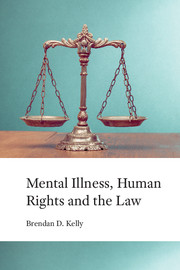Book contents
- Frontmatter
- Contents
- Foreword
- Preface
- Acknowledgements
- List of boxes
- List of legislation, treaties and conventions
- List of cases
- 1 Human rights and mental illness
- 2 Mental Health Acts 1983 and 2007: England and Wales
- 3 Fusing mental health and capacity legislation: Northern Ireland
- 4 Mental Health Act 2001: Ireland
- 5 The challenges of reform: Scotland
- 6 Structural violence, power and mental illness
- 7 Conclusions: fighting for rights
- Notes
- References
- Index
1 - Human rights and mental illness
Published online by Cambridge University Press: 01 January 2018
- Frontmatter
- Contents
- Foreword
- Preface
- Acknowledgements
- List of boxes
- List of legislation, treaties and conventions
- List of cases
- 1 Human rights and mental illness
- 2 Mental Health Acts 1983 and 2007: England and Wales
- 3 Fusing mental health and capacity legislation: Northern Ireland
- 4 Mental Health Act 2001: Ireland
- 5 The challenges of reform: Scotland
- 6 Structural violence, power and mental illness
- 7 Conclusions: fighting for rights
- Notes
- References
- Index
Summary
On 17 December 1991, the United Nations (UN) General Assembly formally adopted Resolution 46/119, which contains the Principles for the Protection of Persons with Mental Illness and the Improvement of Mental Health Care (United Nations, 1991). These principles articulate a range of rights to which individuals with mental illness are entitled, including the right to receive the best available mental healthcare, to live, work and receive treatment in the community, and to access appropriately structured and resourced mental health facilities. Furthermore, mental healthcare should be based on internationally accepted ethical standards and an impartial review body should, in consultation with mental health practitioners, review the cases of involuntary patients.
Although these principles do not have the status of ‘hard law’ and nation states are not obliged to adhere to them, they nonetheless represent an important recognition of the idea that individuals with mental illness require specific protection of human rights for the reason that they are mentally ill, with all of the challenges, difficulties and discrimination that this can bring (Goldman, 2000; Harding, 2000; Kelly, 2001). This chapter begins by describing the gradual emergence of this idea, commencing with the development of the concept of human rights and the emergent relationship between mental illness and the language of human rights during the 19th century. This is followed by a consideration of the UN's Universal Declaration of Human Rights (adopted in 1948) and subsequent expressions of human rights values in international legislative forms, including the Council of Europe's European Convention on Human Rights (ECHR) (drafted in 1950) (Council of Europe, 1950). The ECHR was given further effect in the UK through the Human Rights Act 1998 and in Ireland through the European Convention on Human Rights Act 2003.
The purpose of this discussion is to describe one element of the legislative background (i.e. the human rights element) against which new mental health legislation has been or is being developed in England and Wales (Mental Health Act 2007), Ireland (Mental Health Act 2001), Scotland (Mental Health (Scotland) Act 2015) and Northern Ireland (Mental Capacity Bill 2015). Finally, this chapter presents and examines relevant provisions of the UN Principles for the Protection of Persons with Mental Illness and the Improvement of Mental Health Care (United Nations, 1991) and the UN Convention on the Rights of Persons with Disabilities (United Nations, 2006).
- Type
- Chapter
- Information
- Mental Illness, Human Rights and the Law , pp. 1 - 34Publisher: Royal College of PsychiatristsPrint publication year: 2016



